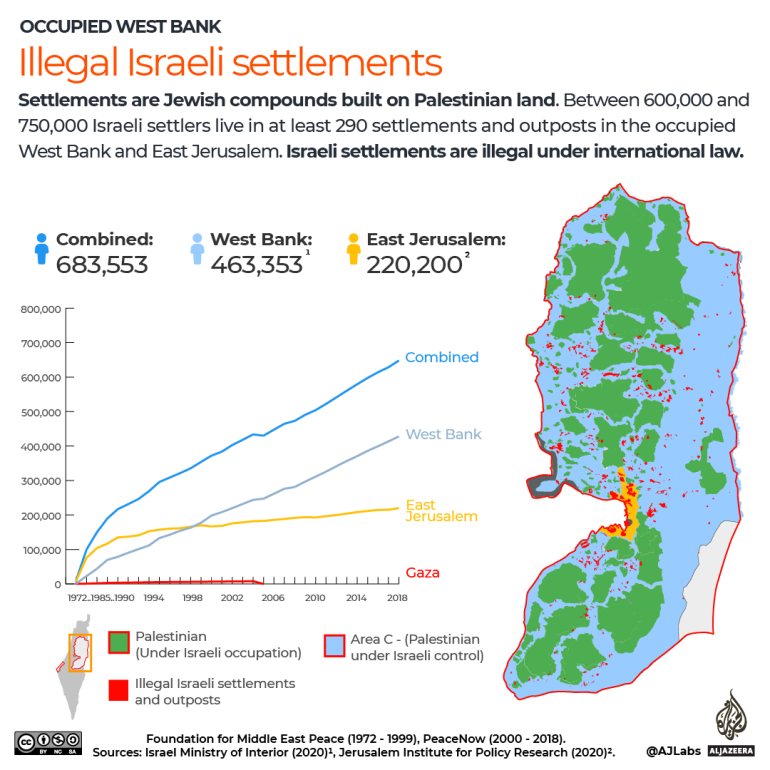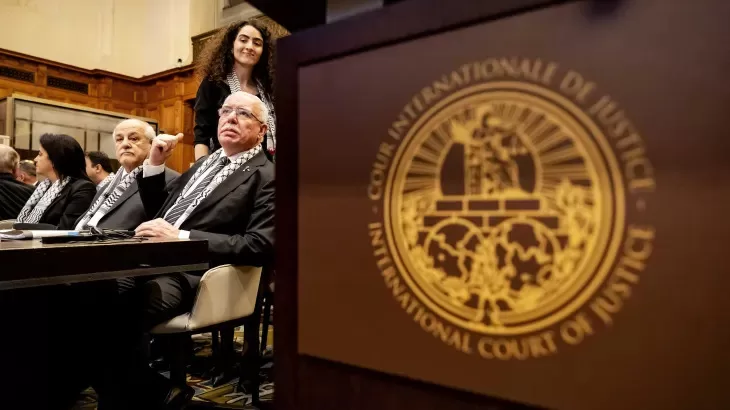- Oral proceedings continue at the International Court of Justice (ICJ) on the legal consequences of Israel’s occupation of Palestinian territories. South Africa, Algeria, Saudi Arabia, the Netherlands, Bangladesh and Belgium present early arguments.
- More than 50 states and at least three international organisations will address judges at the United Nations’ top court until February 26. A nonbinding legal opinion is expected after months of deliberation by the judges.
- On Monday, Palestinian representatives presented their arguments on the legal consequences of Israel’s occupation of the West Bank, East Jerusalem and Gaza Strip. The occupation is illegal and must be brought to an immediate, unconditional and total end, they argued.
- Israel is not attending the hearings but sent a five-page written statement saying an advisory opinion would be “harmful” to attempts to resolve the conflict because questions posed by the UN General Assembly are prejudiced.
-
Israel cannot rely on self-defence to justify its actions
The representative of Bangladesh Riaz Hamidullah is stressing that the principle of self-defence does not offer legal grounds for prolonged occupation.
- Israel’s occupation runs counter to three basic tenants of international law: The right to self-determination; the prohibition to acquire territory by force; the prohibition of racial discrimination and apartheid.
- As mandated by international law, any occupation must be temporary and acquiring territory is illegal. Israel’s prolonged occupation, coupled with the acquisition of territory, violates international law.
- The right to self-defence does not justify the violation of international law, including the right to self-determination. Israel cannot rely on self-defence to justify its actions.
- There is broad consensus that Israel, through its denial of self-determination of the Palestinian people, has violated peremptory norms of international law while also hindering the prospects for a just and lasting peace.
Click -
What Israel is saying about the UN court proceedings
Israel rejects accusations of committing “apartheid” against the Palestinians and usually dismisses UN bodies and international tribunals as unfair and biased against it.
Israel isn’t making an oral statement during the hearings, taking place against the backdrop of the war in Gaza that has killed more than 29,000 Palestinians.
Israel sent a five-page written statement saying an ICJ advisory opinion would be “harmful” to attempts to resolve the conflict with the Palestinians.
The hearings are “designed to harm Israel’s right to defend itself from existential threats”, and “dictate the results of a diplomatic settlement without any negotiations”, Prime Minister Benjamin Netanyahu’s office said.

Relatives mourn loved ones killed in Israeli attacks in Deir el-Balah, central Gaza [Ashraf Amra/Anadolu Agency] Click -
More from the Netherlands’ representative
More on the remarks made by the Netherlands’ representative René J.M. Lefeber.
- The occupying power shall not deport or transfer part of the population in the territory it occupies, which constitutes a war crime under the Rome Statute of the International Criminal Court.
- Once an occupation has occurred, the occupying power has the duty to respect and protect civilians.
- A serious breach of a peremptory norm should be dealt with in the context of the United Nations, but if this fails, states shall cooperate to bring the unlawful situation to an end.
- They shall not recognise as lawful the situation created by such breach and shall not render aid or assistance in maintaining the situation.
Click -
The Netherlands presents its arguments
The representative for the Netherlands, René J.M. Lefeber, has presented his arguments before the court.
- The court has jurisdiction to give advisory opinion.
- All people have a right to self-determination as per the UN Charter. There is a duty to abstain from actions that contravene this right.
- The right to self-determination is applicable to people under occupation and colonial domination, as well as people living in independent states.
- A prolonged occupation obstructs the principle of self-determination.
- The occupation of foreign territory can be legitimate in response to an armed attack provided the principles of necessity and proportionality are respected.
- An occupation that fails to fulfil these requirements may lose its legal basis and therefore violate the prohibition of the use of force.
Click -
More from Algerian jurist Ahmed Laraba
- A violent contrast exists between theoretical appearances sketched out by Israel with a very broad brush and the reality Algeria considers.
- The situation created in 1948 and continuing shows up starkly in the misuse and abuse of the concept of occupation by Israel in occupied Palestinian territories.
- The establishment of Israeli legal rules in the West Bank and successive phases of planned military occupation is followed by the beginning of colonisation.
- The most striking feature of the West Bank resides in the spectacular increase in the establishment of settlements between 2012 and 2022, the numbers went from 520,000 settlers to 700,000.
- All historians of colonisation stress the compelling importance of the dispossession of land in establishing an accelerated colonisation. That to Algeria is a particularly striking example.
Click here to share on social media -
First statements at ICJ very damaging for Israel
So far the statements made in front of the 15 judges of the ICJ have been absolutely damaging for Israel.
South Africa was focusing on the apartheid regime that Israel has imposed on the Palestinian people, calling it a colonial system, and all three speakers demanded the court put an end to the occupation and have illegal settlements removed. They also called for reparations for the Palestinian people to be put in place.
They also talked about the bloody assault taking place in Gaza. South Africa played a key role in an earlier case brought to the same court accusing Israel of committing genocide in Gaza. Israel was given provisional measures to avoid such a scenario.
Click here to share on social media -
More from Saudi Arabia’s envoy Ziad al-Atiyah
- Israel has committed the most egregious violations of its fundamental international obligations regarding its treatment of the Palestinians.
- It has ignored multiple UN Security Council and General Assembly resolutions condemning its conduct. These violations include measures preventing the Palestinian people from exercising their right of self-defence through various policies and practices.
- These include the continuing illegal settlement of the occupied territory, the expulsion of Palestinians from their homes, and theft of Palestinian property.
- Israel makes no secret of its intention to maintain and expand illegal settlements.
- Israel’s 2018 Basic Law shows its disdain for the Palestinian people’s right to self-determination by declaring the holy city of Jerusalem complete and united as Israel’s capital.

Click here to share on social media -
Source:https://www.aljazeera.com/news/liveblog/2024/2/20/israels-occupation-of-palestine-live-day-2-of-icj-arguments-continues

















